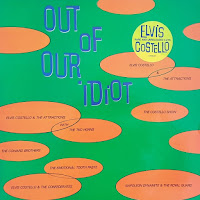Spike
release date: Feb. 6, 1989
format: vinyl / cd
[album rate: 3,5 / 5]
[3,64]
producer: Elvis Costello, Kevin Killen & T Bone Burnett
label: Warner Bros. - nationality: England, UK
12th studio album by Elvis Costello is his first with Warner Bros., and it's his first album since 1977 not to feature his regular backing band, The Attractions. On top of that, the album has been recorded with musicians in four different locations: in Dublin - with appearances of various artists of Irish folk and traditional instruments as Irish harp, fiddle, bodhran, bouzouki, and ;uilleann pipes played by Derek Bell (The Chieftains), Christy Moore (Planxty, The Dubliners), Dónal Lunny (Planxty), Steve Wickham (The Waterboys), Davy Spillane and Frankie Gavin; in London - with a selection of famous artists like Chrissie Hynde (The Pretenders), Paul McCartney, Nick Lowe and Pete Thomas (The Attractions); in New Orleans - primarily with famous instrumentalists of traditional jazz like Lionel Batiste, Willie Green, Jenell Marshall, Kevin Harris, Charles Joseph, Roger Lewis, Efrem Towns, and Allen Toussaint; and in Hollywood - including a bunch of American all stars like Jerry Marotta, Jim Keltner, Jerry Scheff, Roger McGuinn, and Mitchell Froom - just to mention some. This means, Warner has truly set up an extraordinary wide range of musicians to give birth to Costello's "new face in town", so to speak.
Stylistically, this falls in its own category when comparing to former albums, but it initiates a style, which will later be closely associated with Costello's name. On Spike he combines the many influences he has proven to share bonds with, but the connection to new wave or power pop has ended and instead a stronger profile as singer / songwriter is established by focusing on more mainstream pop / rock with the addition of folk rock and jazz as the strongest elements.
The album sold well, although, it didn't really surpass former sales numbers peaking at #5 in the UK, and early albums like My Aim Is True and Armed Forces sold better - Spike sold Gold both in the UK and in the US but the main difference is that the first single "Veronica", written in collaboration with Paul McCartney, became Costello's first number #1 single hit on the Alternative Airplay charts in the US (number #10 on the Mainstream Rock list). The single peaked as number #31 in the UK, thus not really making a major leap up in terms of sales on the national market. However, the video for the single won the award for 'Best Male Video' at the 1989 MTV Awards show in Los Angeles.
Music critics were divided about the 'new Costello' and as to whether the change of style was an improvement. Yes, the UK music magazines Q and NME were rather overwhelmed in their 5 stars reviews, but on the other side of the Atlantic the reception was more laid back. Entertainment Weekly gave it a C+ (their lowest rate of all his albums), and allmusic.com and Rolling Stone were also less enthusiastic.
I never embraced the new style Costello introduced with Spike - which is said to refer to American band leader, Spike Jones - and in retrospect I see it as the first nail to my loss of interest in his later studio releases. I purchased the album upon its release, but kept playing King of America and Blood and Chocolate more frequently. I find the album too polished and over-arranged trying too hard to satisfy a mainstream audience. The songs are of varying quality, ranging from greatness to oddity. The fine "Veronica" is an example of this. It has its moments and is a fine song but it also displays an abundance of strings, horns and heavy orchestration that simply makes it anything but simple. The album contains folk songs that sort of points to his stripped-down King of America only introducing Irish folk instead of American country, and at the same time, it also contains uptempo American-produced generic music pointing in no particular directions, perhaps trying to satisfy a need for fans of Springsteen, Mellencamp, or Jeff Beck, and then there's "...This Town...", a track as if taken from Blood and Chocolate with energy and simplicity but most of the time it showcases new compositions that include New Orleans contemporary jazz or "middle-of-the-road" pop / rock.
To me, this is simply neither one of his best and nor is it any near his worst. It sits there somewhere in the middle pointing towards lesser future albums and reminds us of the greatness he has produced earlier on.




















